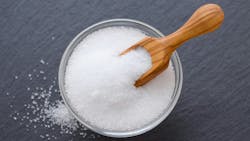Sugar substitutes are increasingly popular to reduce caloric intake and manage health conditions such as diabetes. However, a recent study showed that certain sugar substitutes—specifically xylitol and erythritol—may have adverse cardiovascular effects, including an increased risk for stroke and heart attacks. Elevated platelet activity, which can contribute to the formation of clots, has been identified as a potential mechanism for these adverse events.
Sugar substitute popularity
In recent years, sugar substitutes have become a staple for individuals seeking to reduce their sugar intake without sacrificing sweetness. Marketed as safe alternatives, sugar alcohols such as xylitol and erythritol are commonly used in low-calorie and sugar-free products, including oral hygiene care products such as mouth rinses and toothpastes. Sugar substitutes are compounds that provide sweetness without the calories associated with sugar. Xylitol and erythritol are among the most popular sugar alcohols used in food/oral care products, with a market share of over $700 million as of 2023.1
Generally considered safe and beneficial for dental health and glycemic control, their impact on cardiovascular health has not been fully understood. However, emerging evidence suggests that these substitutes may not be as harmless as initially thought. A new research study found a mechanistic link between xylitol and erythritol and cardiovascular events, specifically heart attacks and stroke.2
Cardiovascular disease and platelets
Cardiovascular diseases (CVDs) remain a leading cause of morbidity and mortality worldwide. Platelets play a crucial role in hemostasis, but their overactivity can lead to thrombus formation, contributing to heart attacks and strokes. Understanding how sugar substitutes influence platelet activity is essential for assessing their safety in populations at risk for CVDs.
The study described
A new study involving more than 3,000 patients from the United States and Europe performed complementary experiments using isolated human platelets, platelet-rich plasma, whole blood, and animal models to examine the effects of xylitol consumption on platelet responsiveness and thrombosis. Among the 3,000 participants, one-third of patients with the highest plasma levels of xylitol had an elevated likelihood of experiencing a cardiovascular event. The study authors found that consumption of products containing xylitol compared to glucose significantly raised platelet responsiveness in all participants, which may contribute to thrombosis, heart attack, or stroke.3
Sugar substitutes and platelet activity
Past studies have demonstrated that both xylitol and erythritol can increase platelet aggregation.4 The combined effects of xylitol and erythritol on platelet activity and cardiovascular health indicate a concerning trend. Both sugar substitutes appear to enhance platelet aggregation and thrombus formation, which are critical factors in the development of heart attacks and strokes. These findings underscore the need for caution when recommending sugar substitutes to individuals at increased risk for or preexisting CVD.
Limitations of the study
A sicker population was studied: This study showed an association—not causation—so a direct link between these sugar substitutes and cardiovascular events was not established. In addition, according to a response by the Calorie Control Council, a trade association representing the low- and reduced-calorie food and beverage industry, “These results may not apply to the general population because some people in the study already had a higher risk of having problems with their heart and blood vessels.”
For example, the average age of study participant was 64, with over 70% of individuals having hypertension and over 75% having some form of existing coronary artery disease. In addition, this study did not control for confounding variables such as preexisting inflammation, metabolic dysfunction, and breakdowns in xylitol/erythritol processing, all of which can elevate the risk for thrombotic episodes. Therefore, application of these study results may not apply to a healthy population.
Reverse causation: Another limitation in this study may involve the metabolic breakdown of xylitol in this patient population. Patients with existing metabolic dysfunction, such as this population examined, have an increased risk of breakdown in the glucuronate pathway, which is responsible for breaking down xylitol. Therefore, these patients would have higher xylitol levels even without ingesting xylitol. This is a problem of reverse causation. Do these high levels that result in increased cardiovascular events result from metabolic dysfunction or actually ingesting xylitol?
Questionable application to topical oral agents: Even if further randomized control trials evaluate dietary intake of xylitol and find a positive association with increased cardiovascular events, how would this translate to application of oral therapeutics containing xylitol? Typical oral agents are not ingested and, if unintentionally swallowed, constitute a very small percentage of intentional dietary intake. Therefore, how does ingestion data compare to oral care topical delivery systems?
Further research is needed to elucidate the long-term effects of sugar substitutes on cardiovascular health. Large-scale, randomized controlled trials should be conducted to confirm the findings of current studies and to explore the underlying mechanisms in greater detail.
Conclusion
While sugar substitutes like xylitol and erythritol offer benefits in terms of calorie reduction and glycemic control, emerging evidence suggests that they may pose cardiovascular risks. Increased platelet activity and thrombus formation linked to these substitutes highlight the need for caution, particularly among individuals with existing cardiovascular conditions. Further research is necessary to fully understand the implications of these findings and to develop safer alternatives for sugar substitution.
Editor’s note: This article originally appeared in Perio-Implant Advisory, a chairside resource for dentists and hygienists that focuses on periodontal- and implant-related issues. Read more articles and subscribe to the newsletter.
References
- Beer JH, Allemann M. Xylitol: bitter cardiovascular data for a successful sweetener. Eur Heart J. 2024:ehae252. doi:1093/eurheartj/ehae252
- Witkowski M, Nemet I, Li XS, et al. Xylitol is prothrombotic and associated with cardiovascular risk. Eur Heart J. 2024;ehae244. doi:10.1093/eurheartj/ehae244
- Cleveland clinic-led study links sugar substitute to increased risk of heart attack and stroke. News release. EurekAlert. American Association for the Advancement of Science (AAAS). June 6, 2024. Accessed June 10, 2024. https://www.eurekalert.org/news-releases/1046958
- Witkowski M, Nemet I, Alamri H, et al. The artificial sweetener erythritol and cardiovascular event risk. Nat Med. 2023;29(3):710-718. doi:10.1038/s41591-023-02223-9
About the Author

Scott Froum, DDS
Editorial Director
Scott Froum, DDS, a graduate of the State University of New York, Stony Brook School of Dental Medicine, is a periodontist in private practice at 1110 2nd Avenue, Suite 305, New York City, New York. He is the editorial director of Perio-Implant Advisory and serves on the editorial advisory board of Dental Economics. Dr. Froum, a diplomate of both the American Academy of Periodontology and the American Academy of Osseointegration, is in the fellowship program at the American Academy of Anti-aging Medicine, and is a volunteer professor in the postgraduate periodontal program at SUNY Stony Brook School of Dental Medicine. He is a trained naturopath and is the scientific director of Meraki Integrative Functional Wellness Center. Contact him through his website at drscottfroum.com or (212) 751-8530.

